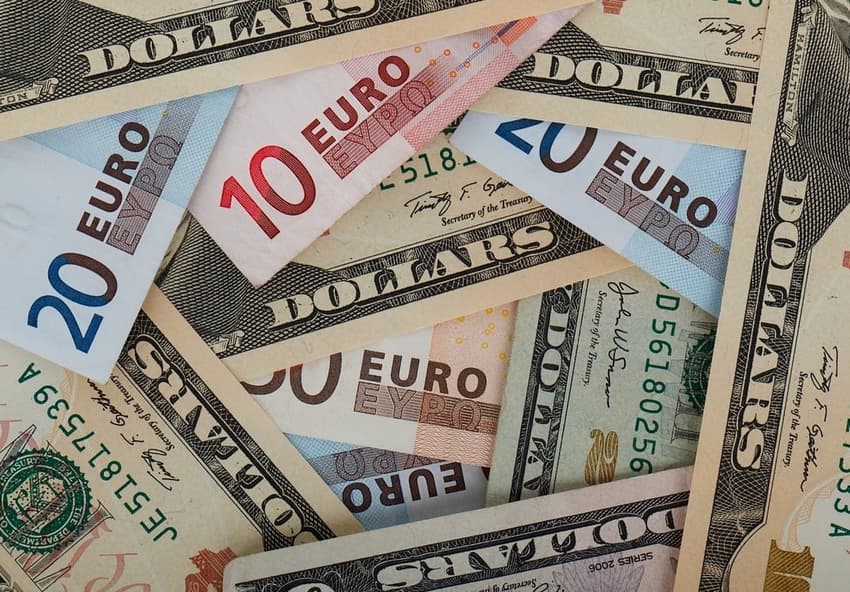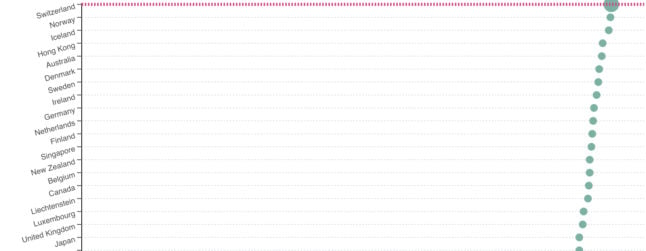Is Switzerland expensive for the Swiss - or just for tourists?

There is no doubt that Switzerland is a high-cost country, but is it costly only for visitors or also for the residents? The answer may surprise you (or perhaps not).
How many times have you heard a foreigner say, ‘let’s visit Switzerland, it’s really cheap there'. Probably never, and there is a good reason for that.
Along with Scandinavian countries (Sweden, Denmark, Norway and Iceland), Switzerland is among the most expensive countries in Europe, as numerous international rankings show.
Why is Switzerland expensive?
You’d probably need a degree in economics to understand this, but there are several factors that contribute to this phenomenon, not the least of which is — perhaps paradoxically — its wealth.
Due in large part to its stable and resilient economy (which resisted even the Covid crisis), Switzerland is one of the richest countries in the world, outdoing, in terms of per-capita GDP, even the United States.
READ ALSO: Why is Switzerland so rich?
It has a very high standard of living, which the United Nations' Human Development Index ranks as the best in the world.

However, a high standard of living doesn’t come cheap. It is economically impossible for a wealthy, prosperous nation like Switzerland to have low-priced goods and services.
Take, for example, wages. Swiss salaries are, on average, the world’s highest (read more about this below).
This means a Swiss company that pays its employees a (comparatively) high wage, can’t afford to sell its goods or service cheaply, as it wouldn’t make any profit. The logic here is quite simple.
Among other, often cited reasons, are protectionism and lack of competition, which are inter-related, as the former invariably leads to the latter.
Trade protectionism is a policy that protects domestic industries from foreign competition. This means that certain Swiss products have no foreign competitors vying for the consumers’ attention, and forcing to lower the price.
This is obviously positive for the Swiss economy, but less good for consumers.
So to go back to the original question: is Switzerland expensive for the Swiss or just for foreign tourists?
Let’s look at tourists first
It all comes down to two things: the tourist’s income level and the exchange rate between their country’s currency and the Swiss franc.
Generally, the franc is stronger than other currencies, including the euro and the US dollar. This means that people coming from abroad and converting their currency into CHF will ‘lose’ in the purchasing power in the process.
For instance, an American who exchanges $100 to CHF will get 89 francs (at the rates at the time of writing), and will immediately notice that $100 goes much further in the US (except maybe in high-cost cities) than 89 francs in Switzerland.
So the strength of the Swiss franc is great for Swiss tourists going abroad, but not vice-versa.
That is the reason why so many foreigners complain about Swiss prices, but keep in mind they are based on Swiss salaries, not on foreign ones.

Want to stock up on chocolate in Switzerland? It may set you back. Photo: Pixabay.
What about the Swiss?
Whether or not people in Switzerland find their country excessively expensive depends, of course, on their income.
The median salary in Switzerland is 80,000 francs a year (which converts to about $90,000 and 81,600 euros).
As a comparison, a median wage in the US is $52,800, and across the European Union it depends on the country, ranging from the higher end, 43,800 euros in Germany (about 43,000 francs) to the lower, 22,000 euros (21,555 francs) in Portugal.
‘Median’ means that 50 percent of people earn less and 50 percent more.
Those whose wages are below that threshold will logically find prices in Switzerland too high, while those making more than the median figure, will probably feel the effect much less.
A lot also depends on where in Switzerland you happen to live, as people in some cantons have more disposable income (money left to spend after all the fixed costs are paid), and therefore a higher purchasing power than in others.
READ ALSO: Swiss cantons with the highest (and lowest) purchasing power
Also — and especially if you are comparing the cost of living in Switzerland with other countries, keep in mind that some things are actually cheaper here than elsewhere (especially now, as Switzerland’s inflation rate is much lower than other countries’).
Among them are lower taxes, university tuition, the price of electronics, and other consumer goods listed here:
READ ALSO: 12 things that are actually 'cheaper' in Switzerland
Last but certainly not least, shopping at budget supermarkets like Aldi, Lidl and Denner will also go a long way toward making Switzerland more affordable.
Comments
See Also
How many times have you heard a foreigner say, ‘let’s visit Switzerland, it’s really cheap there'. Probably never, and there is a good reason for that.
Along with Scandinavian countries (Sweden, Denmark, Norway and Iceland), Switzerland is among the most expensive countries in Europe, as numerous international rankings show.
Why is Switzerland expensive?
You’d probably need a degree in economics to understand this, but there are several factors that contribute to this phenomenon, not the least of which is — perhaps paradoxically — its wealth.
Due in large part to its stable and resilient economy (which resisted even the Covid crisis), Switzerland is one of the richest countries in the world, outdoing, in terms of per-capita GDP, even the United States.
READ ALSO: Why is Switzerland so rich?
It has a very high standard of living, which the United Nations' Human Development Index ranks as the best in the world.

However, a high standard of living doesn’t come cheap. It is economically impossible for a wealthy, prosperous nation like Switzerland to have low-priced goods and services.
Take, for example, wages. Swiss salaries are, on average, the world’s highest (read more about this below).
This means a Swiss company that pays its employees a (comparatively) high wage, can’t afford to sell its goods or service cheaply, as it wouldn’t make any profit. The logic here is quite simple.
Among other, often cited reasons, are protectionism and lack of competition, which are inter-related, as the former invariably leads to the latter.
Trade protectionism is a policy that protects domestic industries from foreign competition. This means that certain Swiss products have no foreign competitors vying for the consumers’ attention, and forcing to lower the price.
This is obviously positive for the Swiss economy, but less good for consumers.
So to go back to the original question: is Switzerland expensive for the Swiss or just for foreign tourists?
Let’s look at tourists first
It all comes down to two things: the tourist’s income level and the exchange rate between their country’s currency and the Swiss franc.
Generally, the franc is stronger than other currencies, including the euro and the US dollar. This means that people coming from abroad and converting their currency into CHF will ‘lose’ in the purchasing power in the process.
For instance, an American who exchanges $100 to CHF will get 89 francs (at the rates at the time of writing), and will immediately notice that $100 goes much further in the US (except maybe in high-cost cities) than 89 francs in Switzerland.
So the strength of the Swiss franc is great for Swiss tourists going abroad, but not vice-versa.
That is the reason why so many foreigners complain about Swiss prices, but keep in mind they are based on Swiss salaries, not on foreign ones.

What about the Swiss?
Whether or not people in Switzerland find their country excessively expensive depends, of course, on their income.
The median salary in Switzerland is 80,000 francs a year (which converts to about $90,000 and 81,600 euros).
As a comparison, a median wage in the US is $52,800, and across the European Union it depends on the country, ranging from the higher end, 43,800 euros in Germany (about 43,000 francs) to the lower, 22,000 euros (21,555 francs) in Portugal.
‘Median’ means that 50 percent of people earn less and 50 percent more.
Those whose wages are below that threshold will logically find prices in Switzerland too high, while those making more than the median figure, will probably feel the effect much less.
A lot also depends on where in Switzerland you happen to live, as people in some cantons have more disposable income (money left to spend after all the fixed costs are paid), and therefore a higher purchasing power than in others.
READ ALSO: Swiss cantons with the highest (and lowest) purchasing power
Also — and especially if you are comparing the cost of living in Switzerland with other countries, keep in mind that some things are actually cheaper here than elsewhere (especially now, as Switzerland’s inflation rate is much lower than other countries’).
Among them are lower taxes, university tuition, the price of electronics, and other consumer goods listed here:
READ ALSO: 12 things that are actually 'cheaper' in Switzerland
Last but certainly not least, shopping at budget supermarkets like Aldi, Lidl and Denner will also go a long way toward making Switzerland more affordable.
Join the conversation in our comments section below. Share your own views and experience and if you have a question or suggestion for our journalists then email us at [email protected].
Please keep comments civil, constructive and on topic – and make sure to read our terms of use before getting involved.
Please log in here to leave a comment.